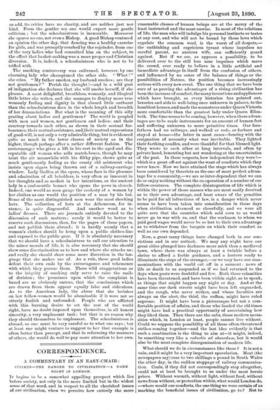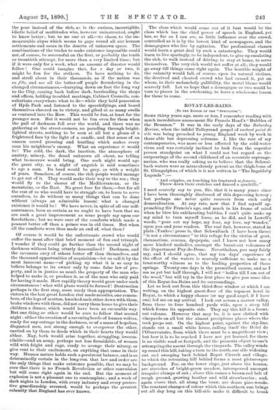CORRESPONDENCE.
A COMMENTARY IN AN EASY-CHAIR: STRIKES-THE DANGER TO CIVILISATION-A DARK NIGHT IN LONDON. IT begins to be a somewhat appalling prospect which lies before society, not only in the more limited but in the widest sense of that word, and in respect to all the cherished issues of our civilisation, when we perceive how entirely the more
reasonable classes of human beings are at the mercy of the least instructed and the most unwise. In most of the relations of life, the man who will indulge his personal instincts or tastes at any cost, and who will not be bound by those laws which regulate the common weal, is the worst of all despots,— the unthinking and capricious tyrant whose impulses no careful parent, no anxious wife, can sufficiently guard against. But if we are, as appears a possibility, to be delivered over to the still less sane impulses which move the crowd, ever ready to believe in a little artificial and immediate advantage to itself from the confusion of others, and influenced by no sense of the balance of things or the possibilities of Nature, the position becomes increasingly serious with every new event. The one thing that we have been sure of as proving the advantages of a rising civilisation has been the increase of comfort, the manyinventions and appliances which have brought, as every historian has pointed out, luxuries and aids to well-being once unknown in palaces, to the humblest houses, and made the seamstress under Queen Victoria more comfortable than the greatest lady under Queen Eliza- beth. The time seems to be coming, however, when these advan- tages are to be made instruments for an amount of human fret and suffering unknown to more primitive times. Our fore- fathers had no railways, and walked or rode, or forbore and stayed at home—the latter in most cases—bearing with the resignation of necessity what was inevitable. They lighted their farthing candles, and were thankful for that blessed light. They wrote to each other at long intervals, and often by private hand, lamenting but not wondering at the uncertainties of the post. In these respects, how independent they were !— which is a great off-set against the want of comforts which they never knew. Now we have attained the stage which has always been considered by theorists as the one of most perfect advan- tage for a community,—we are so inter-dependent that we can do or enjoy nothing without the co-operation of a number of our fellow-creatures. The complete disintegration of life which is within the power of those masses who are most easily deceived as to their own advantage, and least aware of the penalties to be paid for all infractions of law, is a danger which, never seems to have been taken into consideration in those days when civilisation advanced so cheerfully, and we were all quite sure that the countries which sold corn to us would never go to war with us, and that the workmen to whom we paid good wages would never be so lost to their own advantage as to withdraw from the bargain on which their comfort as well as our own depended.
Now, a great many things have changed both in our con- victions and in our outlook. We may any night have our great cities plunged into darkness more mirk than a medizeval town, where there was always at least a twinkle before a shrine to afford a feeble guidance, and a lantern ready to illuminate the steps of the stranger,—or we may have our com- munications with the world cut off in a moment : news of life or death to us suspended as if we had returned to the- days when posts were doubtful and few. Both these calamities have been threatened, and have been within sight, so to speak, as things that might happen any night or day. And at the same time our dark streets might have been left unguarded, and the rough, who never strikes, and whose faculties are always on the alert, the thief, the ruffian, might have ruled supreme. It might have been a picturesque but not a com- fortable position of affairs, and those who lauded the old times- might have had a practical opportunity of ascertaining how they liked them. Then there are the cabs, those modern neces- sities which, in London at least, people cannot live without- Could we suppose the possibility of all these often-threatened strikes coming together—and the last idea evidently is that such a combination is the thing to aim at—it might, indeed, be something very like a reductio ad absurdum, but it would also be the most complete disorganisation of modern life.
What should we do in circumstances like these ? It is not a vain, and it might be a very important speculation. Meat (the newspapers say) rose to two shillings a pound in South Wales the other day, in the sudden stoppage of railway communica- tion. Coals, if they did not correspondingly stop altogether, could not at least be brought to us under the most heroie prices. Without warmth, without light, without food, without news from without, or protection within, what would London do, —where would our comforts, the one thing we were certain of as marking the beneficial issues of civilisation, go to ? Not to the poor instead of the rich, as is the curious, incorrigible, idiotic belief of multitudes who, however uninstructed, ought to know better ; but to no one at all,—to chaos, to the im- measurable abyss which seems to gape round all our human settlements and oases in the deserts of unknown space. The combinations of the trades to make existence impossible could not, of course, be successful on the first, or probably the tenth or twentieth attempt, for more than a very limited time; but if it were only for a week, what an amount of disaster would follow ! One could imagine that, for a day or two, it might be fun for the strikers. To have nothing to do, and stroll about in their thousands, as if the nation was en fete, and see all the better-off people floundering in the changed circumstances,—hurrying down on foot the long way to the City, coming back before dark, barricading the shops and offices, holding troubled meetings, Cabinet Councils, con- sultations everywhere what to do—while they held possession of Hyde Park and listened to the speechifyings, and heard themselves cheered on to victory, and gibed at as many swells as ventured into the Row. This would be fun, at least for the younger men. But it would not be fun even for them when the pall of darkness fell over the world, and there was no gathering at the street-corners, no parading through bright- lighted streets, nothing to be seen at all but a gleam of a frightened face by the light of a candle, and that sense of an unseen crowd pressing and hustling which makes every man his neighbour's enemy. What an experience it would be ! The cold, the dark, the inaction, the atmosphere of anxiety, misery, the dread unknown all about, no telling what to-morrow would bring. One such night would age the great city, as a night of anguish is said sometimes to age a man. Its head would be grey, as with a weight of years. Somehow, of course, the rich people would manage to get out of it. They would make their way to the sea ; they would fly to the shores of the Mediterranean, or the mountains, or the East. No great fear for them,—but for all the rest of us who would have to struggle on, to learn to serve ourselves, to do without so many things that can be done without (always an admirable lesson) what a changed existence it would be ! We have never, in spite of all our self- assurances, been so certain as we ought to have been that we are such a great improvement as some people say upon our forefathers ; but we were sure of the comforts which made a peasant better off than a prince was in old times. But when all the comforts were thus made an end of, what then ?
Of course it would be the unfortunate crowd who would suffer the most after that brief moment of fun and triumph. I wonder if they could go further than the second night of darkness without being utterly demoralised? Darkness, and the ravenous envy of others better off than themselves, and the thousand opportunities of acquisition—let us call it by the most innocent name—of picking up what it is so easy to believe belongs to its owner only by some false law of pro- perty, and is in justice as much the property of the man who helped to make it, or produce it, as of the man who only paid for having it made. How rapidly theory would grow under such circumstances ! what wild plans would be formed ! Destruction perhaps is the first step, more ready than appropriation. The rioters in the last great London riot made missiles, one remem- bers, of the legs of mutton, knocked each other down with them, broke windows with them, did not carry them home to give their children a dinner, which would have been an excusable way. But one thing or other would be sure to follow that second night : either the creation of a ravening horde of human wolves, ready for any outrage in the darkness, or of a mass of hopeless, disgusted men, not strong enough to overpower the other, carried on by them to deeds which in their hearts they would abhor. Nay, both would arise together, struggling, irrecon- cilable—and an army, perhaps not less formidable, of women wild with fright and rage, ready to avenge their misery, or give vent to their excitement, on anything that came in their way. Human nature holds such a persistent balance, and is so determinedly certain in the long-run that law and order are the only things that make existence possible, that we may be sure that there is no French Revolution or other convulsion but will come right again in the end. But the moment of explosion is not a pleasant one to contemplate ; and a week of dark nights in London, with every industry and every protec- tive guardianship arrested, would be perhaps the greatest calamity that England has ever known. The class which would come out of it best would be the class which has the chief power of speech in England, yet has, so far as I can see, so little influence over the crowd, controlled as it is by the lowest kind of newspapers, and the demagogues who live by agitation. The professional classes would learn a great deal by such a catastrophe. They would learn to live sparingly, to be independent, to give up emulating the rich, to walk instead of driving, to stay at home, to serve themselves. The very rich would not suffer at all ; they would go away till things came right again. The horrible weight of the calamity would fall, of course, upon its natural victims, the deceived and cheated crowd who had caused it, yet on whom, in their melancholy gullibility, the moral blame would scarcely fall. Let us hope that a demagogue or two would be torn to pieces in the awakening, to leave a wholesome lesson for those to come.



































 Previous page
Previous page